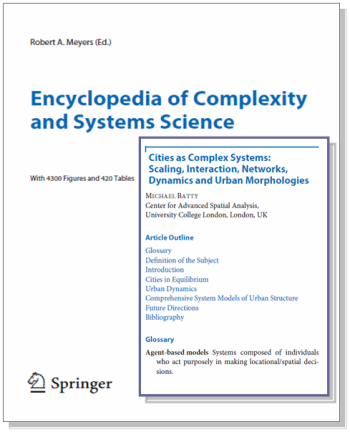| Complexity: what does it mean? How do we define it? This is an impossible task because complex systems are systems that defy definition. Our science that attempts to understand such systems is incomplete in the sense that a complex system behaves in ways that are unpredictable. Unpredictability does not mean that these systems are disordered or chaotic but that defy complete definition. |
| The best definition I have heard recently is from Jeff Johnson at the Open University who at a meeting I attended (17th June 2011) defined them as “systems that have the potential to reconfigure themselves in ways that may be surprising”: in short, systems where this reconfiguration cannot be traced to the action of one single agent whose purpose it is to determine such change. A single agent may be able to reconfigure a complex system but the potential still exists for the system to change without us knowing the actions of any particular agent. |
| Various people have attempted definitions. In the massive 10,000 page Encyclopaedia of Complexity and Systems Science (2009), Robert Meyers, the editor in his introduction defines complex systems as “ … systems that comprise many interacting parts with the ability to generate a new quality of collective behaviour through self-organization, e. g. the spontaneous formation of temporal, spatial or functional structures. They are therefore adaptive as they evolve and may contain self-driving feedback loops. Thus, complex systems are much more than a sum of their parts. Complex systems are often characterized as having extreme sensitivity to initial conditions as well as emergent behaviour that are not readily predictable or even completely deterministic.” |

